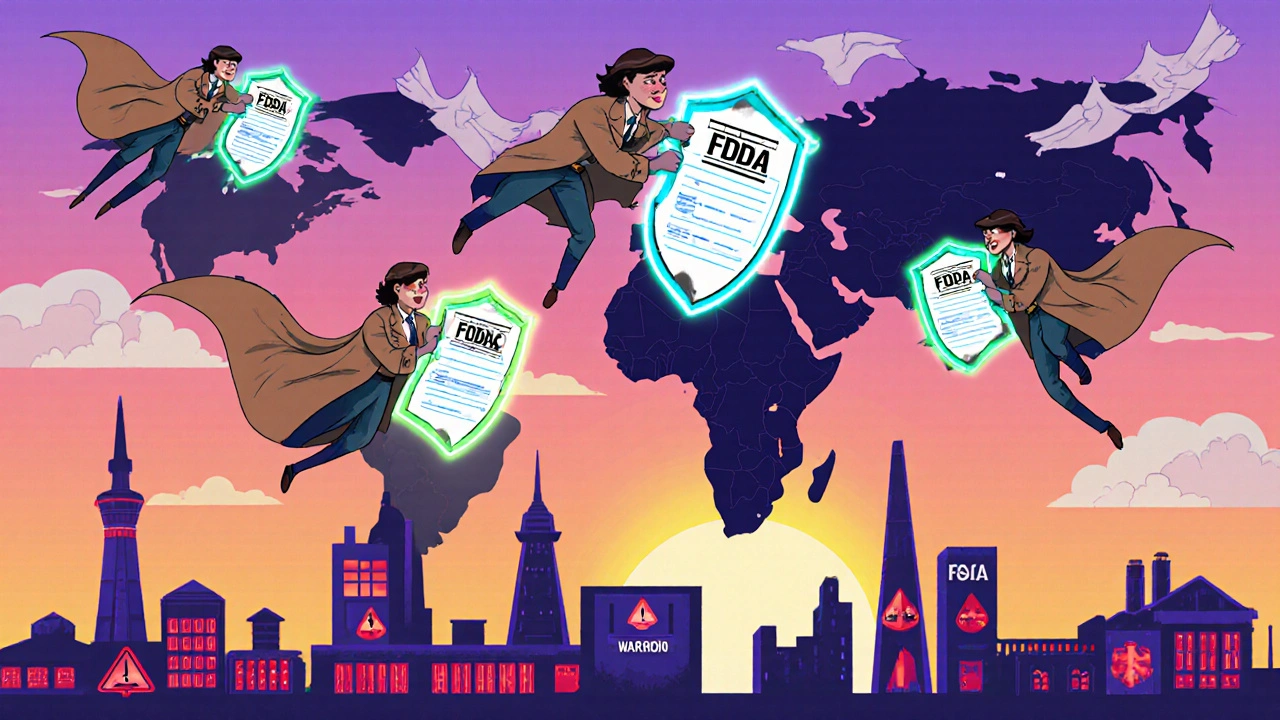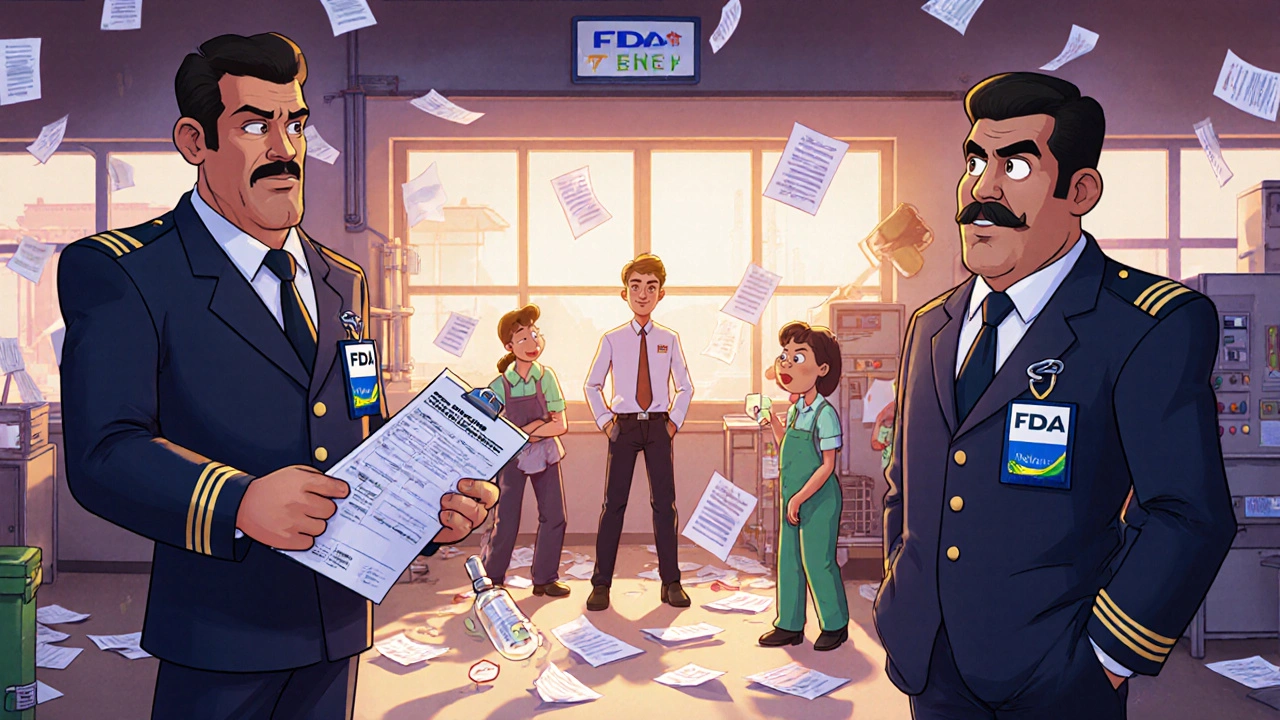The U.S. Food and Drug Administration doesn’t call ahead. No warning. No email. No scheduled meeting. One day, you’re running your facility like normal-workers on the floor, machines humming, records stacked neatly-and the next, two FDA inspectors are standing at your door with badges and Form FDA 482 in hand. This isn’t a drill. It’s an unannounced FDA inspection, and it’s now the standard for every facility making drugs, medical devices, or food sold in the United States-no matter where in the world it’s located.
Why Surprise Visits Exist
The FDA doesn’t do unannounced inspections just to catch people off guard. It does them because preparation hides problems. When a company knows an inspection is coming, they clean up. They fix the obvious issues. They pull out the best records. They put the right people in the right places. But that’s not reality. Reality is what happens on a Tuesday at 10:17 a.m. when no one’s watching. That’s what the FDA wants to see. Before May 2025, this was only true for U.S.-based factories. Foreign manufacturers-especially those in India, China, and other major supply hubs-got advance notice. Sometimes weeks. That created a double standard. A facility in Ohio might be inspected without warning and found with major violations. Meanwhile, a factory in Bangalore, with the same products and same standards, had time to fix everything before the inspectors arrived. And guess what? The FDA found serious problems more than twice as often in foreign facilities that got advance notice. The May 2025 policy change ended that. Now, every facility-domestic or international-gets the same treatment: no notice. The goal is simple: protect American consumers by seeing what’s really happening, not what’s being staged.How an Unannounced Inspection Actually Works
It starts with a knock. FDA investigators show up, identify themselves, and hand over Form FDA 482. That’s the official notice of inspection. They don’t ask for permission. They don’t wait for a manager to finish a meeting. They start immediately. The inspection isn’t a tour. It’s a deep dive. They’ll ask for:- Standard Operating Procedures (SOPs) for every step of production
- Manufacturing records from the last six months
- Deviation logs and corrective action reports
- Training records for every employee involved in quality control
- Equipment maintenance logs
- Raw material testing results
The Big Shift: Foreign Facilities Are Now Targeted
About 80% of the active ingredients in U.S. medicines come from overseas. Nearly 40% of finished drugs are made abroad. Before May 2025, the FDA inspected about 3,000 foreign facilities each year-but most got advance notice. That meant inspectors were often seeing a cleaned-up version of reality. The new policy changes everything. Now, the same surprise inspections that happen in Michigan or California also happen in Mumbai, Shanghai, and Mexico City. The FDA’s Office of Inspection and Investigations ran a pilot program in India and China for years. The results were clear: when facilities didn’t know inspectors were coming, violations were more visible, and compliance was more honest. This isn’t just about fairness. It’s about safety. A facility that falsifies records or hides contamination won’t get caught if they have time to fix it. But if the inspectors show up without warning? The truth comes out. The FDA now says this is a “new era in enforcement.” And they’re serious. They have the legal right to deny, delay, or limit an inspection-and they will take action against any company that tries.
What Happens If You’re Not Ready
Being unprepared isn’t an excuse. It’s a liability. Many companies think they’re fine because they’ve passed announced inspections before. But that’s like thinking you’re a good driver because you passed your DMV test. The real test is driving in rush hour with no warning. If your records are messy, your SOPs are outdated, or your staff doesn’t know what to do when an inspector walks in-you’re at risk. The FDA doesn’t care if you’re a small supplier or a global giant. They care about whether your product is safe. A single Form 483 can block your product from entering the U.S. A pattern of violations can lead to an import alert-meaning every future shipment gets held at the border until you prove you’ve fixed everything. That’s expensive. That’s disruptive. That’s dangerous for your business.How to Get Ready-Without a Warning
You can’t wait for the knock. You have to be ready every day. Here’s what top-performing facilities do:- Run mock inspections monthly. Have someone play FDA inspector. Surprise your team. See where the gaps are.
- Keep records digital and searchable. Paper files get lost. Digital systems with audit trails don’t. Use QMS software that auto-logs changes, tracks approvals, and flags deviations.
- Train everyone-not just managers. Line workers, warehouse staff, janitors-they all need to know what to do if an inspector shows up. Who to call. Where to find documents. What not to say.
- Designate a response team. One person handles the inspector. One handles records. One handles IT. One handles HR. No confusion. No delays.
- Review your SOPs quarterly. If your procedures haven’t changed in two years, they’re probably outdated. Update them. Document the changes. Train on them.

What’s Next? The Unanswered Questions
The policy shift is clear. But some details aren’t. For years, the FDA coordinated foreign inspections with local health authorities. They’d notify the Indian or Chinese food safety agency before arriving. Sometimes, those agencies even joined the inspection. Now? No one knows if that’s still happening. There’s also the issue of language. If an inspector walks into a factory in Vietnam and no one speaks English, how do they communicate? The FDA hasn’t said whether they’ll bring translators or require facilities to have them on standby. Industry experts are watching closely. These are not minor details. They’re operational hurdles that could slow down inspections-or create legal gray areas. But the direction is unmistakable: the FDA is going global, and it’s going hard.Bottom Line: Compliance Isn’t Optional
Unannounced inspections aren’t punishment. They’re protection. For consumers. For honest manufacturers. For the integrity of the entire supply chain. If you’re making something that ends up in a U.S. pharmacy, grocery store, or hospital-you’re under the FDA’s watch. And now, that watch is always on. The best defense? Stop thinking about inspections as events to prepare for. Start thinking about them as a daily standard. Because when the door opens, you won’t have time to fix anything. You’ll only have time to show what you’ve already built.Are FDA inspections always unannounced?
Most are. The FDA’s official stance is that inspections are generally unannounced. The only exceptions are specific programs where advance notice is needed-for example, to ensure translators or key personnel are available. Even then, those are rare. For quality system inspections, especially for Class II and III medical devices, the FDA almost never announces visits. "For cause" inspections and follow-ups are always unannounced.
What happens if a facility refuses an FDA inspection?
Refusing an FDA inspection is a serious violation. The agency has legal authority to take action, including issuing warning letters, seizing products, or blocking imports. Facilities that delay, deny, or limit inspections can face civil penalties and criminal charges. In practice, refusal almost always leads to a product import alert, which halts all shipments until the issue is resolved.
Do foreign manufacturers get any special treatment during unannounced inspections?
No. Since May 2025, foreign manufacturers are held to the exact same standards as U.S.-based ones. There’s no advance notice, no extra time to prepare, and no preferential treatment. The FDA has stated this change eliminates a "double standard" that previously allowed foreign facilities to be inspected under less stringent conditions. The goal is regulatory parity across all suppliers to the U.S. market.
How often do FDA inspections happen now?
There’s no fixed schedule. The FDA uses a risk-based system. High-risk facilities-like those with past violations, complex processes, or overseas locations-are inspected more frequently. The agency has said it will increase the number of unannounced inspections at foreign facilities. While domestic facilities may see inspections every 2-5 years, foreign sites are now being targeted more aggressively, with some receiving multiple unannounced visits in a single year.
Can a company be inspected even if it’s not currently shipping products to the U.S.?
Yes. The FDA has authority to inspect any facility that manufactures products intended for the U.S. market-even if no shipments are currently active. If your facility has ever exported to the U.S., or if you plan to in the future, you’re still under regulatory oversight. Inspections can happen at any time, regardless of current activity. Ignoring compliance because you’re not shipping now is a major risk.


Comments (11)
Scott Walker
Honestly? This is the kind of stuff that keeps me up at night. 😅 I work in pharma logistics and we’ve had inspections before-but never unannounced. The idea that someone could just show up and start digging through your records is wild. But also… kind of fair. If you’re doing it right, you shouldn’t sweat it.
Sharon Campbell
lol so now the fda just shows up at factories like cops at a party? sounds like a power trip to me.
Ashley B
Of course they don’t announce it. The FDA’s been in bed with Big Pharma for decades. This isn’t about safety-it’s about control. They know most foreign labs are clean, but they want to scare them into paying off consultants who ‘help’ them pass. The real scandal? The inspectors get bonuses for issuing 483s. It’s a revenue stream disguised as public health.
Rebekah Kryger
This is pure regulatory overreach disguised as compliance. You can’t just show up unannounced and demand access to proprietary SOPs without a warrant. The FDA’s bypassing due process under the guise of ‘consumer safety.’ This is how authoritarian regimes operate. And now they’re exporting it to India and China? That’s cultural imperialism wrapped in a lab coat.
Jessica M
The implementation of unannounced inspections represents a critical advancement in global pharmaceutical governance. By eliminating advance notice, the FDA ensures that quality systems are not merely performative but are genuinely embedded into daily operational culture. This approach aligns with ICH Q10 guidelines and reinforces the principle of continuous compliance. Facilities that maintain robust quality management systems will not only pass inspection-they will thrive. Those that do not are not merely non-compliant; they are putting patients at risk.
Eric Gregorich
I’ve seen this play out in real time. My cousin runs a small API lab in Hyderabad. They got hit with an unannounced inspection last year. They thought they were fine-had all the paperwork, trained staff, clean rooms. But the inspector pulled a batch from 3 months ago that had a 0.03% impurity spike. The lab had logged it as ‘minor deviation’ and didn’t report it because it was below action limit. Turns out, under the new guidance, even that had to be flagged and investigated. They got a Form 483. Took them 8 months to get off import alert. And guess what? The inspector didn’t even speak Hindi. They had to use a translator who didn’t understand GMP jargon. So half the observations were miscommunicated. The whole system is broken. It’s not about truth-it’s about paperwork theater with a side of cultural ignorance.
Segun Kareem
You know what’s funny? This isn’t about fear. It’s about truth. In Nigeria, we’ve got pharmacies selling fake insulin and antibiotics that don’t even contain the active ingredient. Why? Because someone had time to clean up before the inspector came. The FDA’s move isn’t aggressive-it’s ethical. If your product ends up in someone’s body, it deserves to be held to the same standard whether it was made in Detroit or Delhi. No one’s asking you to be perfect. Just honest. And if you’re honest every day, you won’t panic when the door opens.
Erika Lukacs
The paradox of transparency is that it often requires coercion. The FDA’s unannounced inspections are a form of epistemic violence-forcing truth into visibility by removing the illusion of control. Yet, in doing so, they risk transforming compliance into performative obedience. The real question isn’t whether inspections are fair, but whether they cultivate integrity-or merely fear.
sara styles
Let’s be real-this is just the FDA’s way of pushing American standards onto the rest of the world because they think their way is the only way. They’ve got zero cultural awareness. In China, factories operate on trust and relationships, not 50-page SOPs. You don’t just walk in and demand records like you’re at a Walmart audit. And what about language barriers? You think a 60-year-old line worker in Vietnam who’s never seen an English word is going to understand what ‘deviation log’ means? The FDA doesn’t care. They just want to flex. And now they’re using taxpayer money to bully small manufacturers overseas. This isn’t safety-it’s economic warfare. And don’t tell me they’re not doing it for profit. Every time a facility gets an import alert, American companies get a competitive edge. It’s corporate colonialism with a badge.
Brendan Peterson
I work in QMS software. We’ve had 12 clients get hit with unannounced inspections since May 2025. All passed. Why? Because they stopped treating compliance like a checklist and started treating it like a habit. The key isn’t the inspection-it’s the daily discipline. Digital records. Real-time training logs. Automated alerts. If you’re still using Excel spreadsheets for batch records, you’re already behind. And yes, it’s stressful. But stress is just feedback. The FDA isn’t your enemy. Your outdated systems are.
Victoria Short
idk why people are making this such a big deal. just don't mess up and you'll be fine.